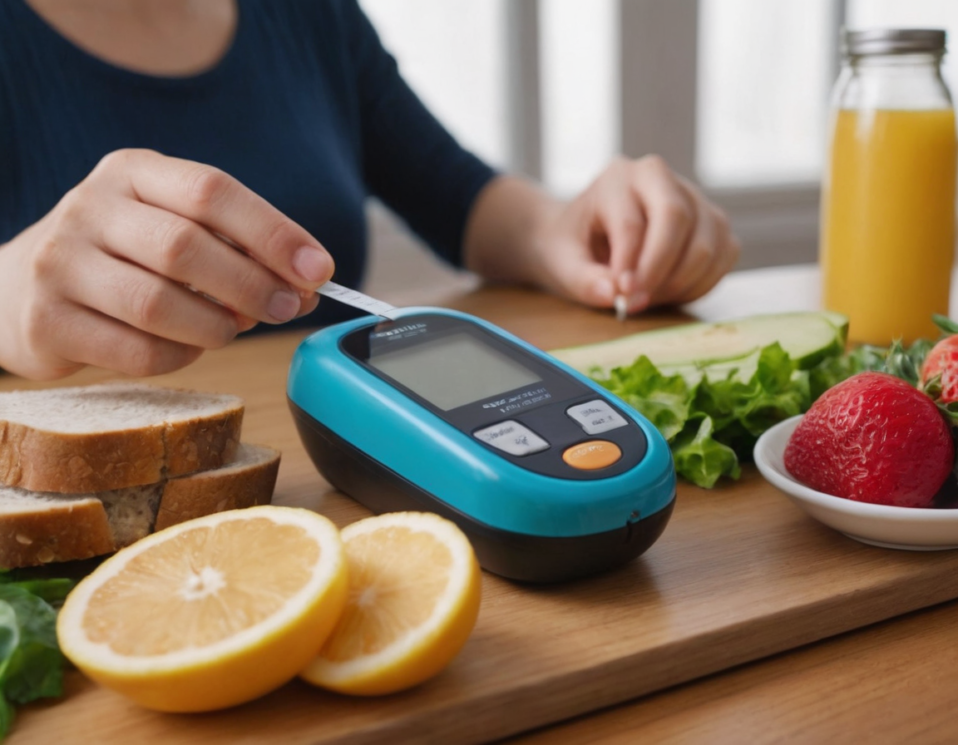Table of Contents
ToggleIntroduction
Diabetes is a chronic disease that affects how your body turns food into energy and Diabetes management is crucial for one’s health and wellbeing. Diabetes Mellitus (DM) is a metabolic disease, involving inappropriate elevation of blood sugar levels. The most common types are type 1 diabetes, type 2 diabetes, and gestational diabetes. No matter the type, uncontrolled blood sugar levels can lead to serious health complications. While there’s no cure, successfully managing diabetes is possible by understanding the Diabetes Symptoms! Diet and exercise are two of the most powerful tools you have. This blog will offer guidance, but always consult your doctor for personalized diabetes management plans.
Diet Fundamentals for Diabetes
Carbohydrates and Your Blood Sugar
Carbohydrates are the main source of energy for your body. However, they break down into glucose (sugar) and raise blood sugar levels. For people with diabetes, it’s crucial to choose carbohydrates wisely and be mindful of how much you eat. Prioritize fiber-rich whole grains (brown rice, quinoa, whole-wheat bread), fruits, vegetables, and beans over processed carbs (white bread, sugary cereals, white rice). These healthier carbs are digested more slowly, preventing blood sugar spikes.
The Power of Portion Control
Even healthy foods need to be eaten in appropriate portions. The plate method is a simple visual tool, but you can also try measuring cups or a food scale for greater accuracy. Working with a Registered Dietitian can help you determine the best portion sizes for your individual needs and find a right Diabetic diet. Ensure you track the symptoms of Diabetes.
Healthy Fats and Protein Choices
Healthy fats are essential for a diabetes-friendly diet! Include sources like avocados, nuts, seeds, olive oil, and fatty fish (salmon, tuna). These fats help you feel full, slow digestion, and improve heart health. Opt for lean protein options like chicken, fish, beans, lentils, tofu, or eggs. Protein promotes fullness and helps manage blood sugar levels.
Sugar-Free Doesn’t Mean Healthy
Be wary of “diabetic” or “sugar-free” packaged foods. They often contain refined carbohydrates or sugar alcohols that can still impact blood sugar. Always read food labels carefully, focusing on the total carbohydrate content and ingredients list. Natural sugar substitutes like stevia or monk fruit may be better options than artificial sweeteners.
Additional Tips
-
- Spread out your carbs: Instead of eating a large carb-heavy meal, spread your carbs throughout the day. This helps prevent sudden blood sugar surges.
-
- Drink plenty of water: Staying hydrated is key for overall health and can help with blood sugar management. Aim for sugar-free beverages like water and unsweetened tea.
-
- Plan ahead: Meal planning and prepping ingredients can make healthy eating easier, especially when you’re short on time.
The Importance of Exercise in Diabetes Management
Exercise plays a vital role in managing diabetes, offering benefits that go far beyond simple blood sugar control. When you exercise, your muscles use glucose for energy, lowering your blood sugar levels naturally. Additionally, regular exercise improves insulin sensitivity, meaning your body needs less insulin to manage blood sugar effectively.
Benefits Beyond Blood sugar Control
Besides its direct impact on blood sugar, exercise delivers numerous health benefits for people with diabetes:
-
- Weight Management: Exercise helps you burn calories and can be key to achieving or maintaining a healthy weight. This is crucial for reducing insulin resistance and improving overall blood sugar control.
-
- Heart Health: Regular physical activity can improve cholesterol levels, lower blood pressure, and boost your cardiovascular health. This is particularly important as people with diabetes are at a higher risk for heart disease. Educate yourself on common symptoms of Heart disease.
-
- Mental Well-being: Exercise is a natural stress reliever and mood booster. It can help combat feelings of depression or anxiety that are sometimes associated with managing a chronic condition like diabetes.
-
- Stronger Bones and Muscles: Building strength through resistance training helps maintain muscle mass and bone density, reducing the risk of falls and injuries that can be more serious with diabetes complications. Often, our daily food intake does not cover essential nutrients so it is recommended to take Multivitamins to cover our daily nutrients dosage.
-
- Improved Sleep: Regular exercise can promote better sleep quality, which is important for overall health and can also positively impact blood sugar management.
Exercises for Diabetes:
Both aerobic and resistance training are beneficial for diabetes management:
-
- Aerobic Exercise: Activities that get your heart pumping like brisk walking, swimming, dancing, or cycling are great choices. Aim for at least 150 minutes of moderate-intensity aerobic exercise per week, spread out over at least three days.
-
- Resistance Training: Exercises that build muscle, like lifting weights, using resistance bands, or bodyweight exercises are essential. Aim for at least 2-3 sessions per week that target major muscle groups.
Making it Work for You
-
- Start Slowly: Don’t try to do too much too soon, especially if you’re new to exercise. Short bursts of activity throughout the day can add up. Gradually increase the duration and intensity of your workouts as your fitness improves.
-
- Find What You Enjoy: The best exercise is the one you’ll stick with! Choose activities you find fun and fit your lifestyle, whether it’s walking your dog, taking a dance class, or gardening.
-
- Talk to Your Doctor: Before starting a new exercise program, it’s essential to discuss it with your doctor. They can help you set safe goals and might need to adjust your medications as you become more active. We at mygenericmeds always strive to provide best health care to our customers and for diabetic patients we have a wide range of Diabetic Care products. Check them out now and avail great discounts from your comfort of your home by ordering now.
-
- Listen to your body: It’s important to rest when needed and pay attention to any pain or unusual Diabetes Symptoms. It’s always better to take a break than risk injury.
-
- Prepare for Success: When managing diabetes, exercise is key, but it’s crucial to stay prepared. Always have a small snack like chocolate or any sweet or glucose tablets on hand to quickly raise your blood sugar if it drops too low (hypoglycemia). Make sure you wear medical identification that clearly tells you have diabetes and whether you take insulin. This ensures proper treatment in an emergency condition. Consider carrying a card or sporting a bracelet or necklace with this vital information.
Easy and Delicious Recipes
Healthy eating for diabetes doesn’t mean sacrificing flavor! Here are a few simple, diabetes-friendly recipes to get you started:
Recipe Example 1: Overnight Oats with Berries and Nuts
-
- Ingredients:
-
- 1/2 cup rolled oats
-
- 1/2 cup milk (plant-based or low-fat)
-
- 1/4 cup plain Greek yogurt
-
- 1 tbsp chia seeds
-
- 1/4 tsp cinnamon
-
- 1/2 cup mixed berries
-
- Handful of chopped nuts (almonds, walnuts)
-
- Ingredients:
-
- Instructions:
-
- Combine oats, milk, yogurt, chia seeds, and cinnamon in a jar or container.
-
- Cover and refrigerate overnight, or at least 4 hours.
-
- In the morning, top with berries and nuts. Enjoy!
-
- Instructions:
Recipe Example 2: Mediterranean Quinoa Salad
-
- Ingredients:
-
- 1 cup cooked quinoa
-
- 1/2 cucumber, chopped
-
- 1/2 cup cherry tomatoes, halved
-
- 1/4 cup chopped red onion
-
- 1/4 cup crumbled feta cheese
-
- 1/4 cup chopped Kalamata olives
-
- 2 tbsp olive oil
-
- 2 tbsp lemon juice
-
- Salt and pepper to taste
-
- Ingredients:
-
- Instructions:
-
- Combine all ingredients in a large bowl.
-
- Toss to coat, and serve chilled or at room temperature.
-
- Instructions:
Recipe Example 3: Salmon with Roasted Vegetables
-
- Ingredients:
-
- 4-ounce salmon filet
-
- 1 cup assorted vegetables (broccoli, bell peppers, zucchini) chopped
-
- 1 tbsp olive oil
-
- Salt and pepper to taste
-
- Herbs of your choice (e.g., thyme, rosemary)
-
- Ingredients:
-
- Instructions:
-
- Preheat the oven to 400 degrees F (200 degrees C).
-
- Toss vegetables with olive oil, salt, pepper, and herbs. Spread on a baking sheet.
-
- Season salmon with salt and pepper. Place it on the baking sheet.
-
- Bake for 15-20 minutes, or until the salmon is cooked through and vegetables are tender.
-
- Instructions:
Snack Attack: Hummus with Veggie Sticks
A classic, healthy snack that’s super easy to make: serve store-bought or homemade hummus with sliced carrots, cucumbers, or bell peppers.
Important Notes:
-
- These are just sample recipes – get creative and use your favorite ingredients!
-
- Always adjust portion sizes according to your individual needs and dietary plan.
-
- Consult a Registered Dietitian for personalized meal planning help and more delicious recipe ideas.
Proactive Health Checkups for Diabetes Management in India
Early detection and proactive management are key to living a healthy life with diabetes in India. Regular preventive health checkups are crucial for identifying potential problems early, tracking Diabetes Symptoms, preventing complications, and ensuring your diabetes management plan is on track. Here’s why checkups are essential and what you need to know in the Indian context:
Why Get Regular Health Checkups?
-
- Early Intervention: Catching diabetes or potential complications like heart disease, kidney issues, nerve damage, and vision problems early allows for timely intervention. This can significantly improve treatment outcomes and prevent serious health complications down the line.
-
- Monitoring Progress: Regular checkups help your doctor track how well your diabetes is controlled. This includes monitoring blood sugar levels (HbA1c), cholesterol levels, blood pressure, and kidney function – all crucial markers for overall diabetes management.
-
- Medication Adjustments: Based on your checkup results, your doctor might need to adjust your medications or dosages. This ensures optimal control and reduces the risk of uncontrolled blood sugar.
-
- Personalized Guidance: Checkups are a valuable opportunity to discuss any concerns or challenges you face with diabetes management. Your doctor can provide personalized advice, address questions, and adjust your plan accordingly for better control.
When to Get Checked in India
The frequency of your checkups will depend on factors like your age, type of diabetes, and overall health. However, here’s a general guideline based on current Indian recommendations:
-
- HbA1c Test: This test measures average blood sugar levels over the past 2-3 months. The Indian Diabetes Federation (IDF) recommends most people with diabetes aim for an HbA1c below 7%. Ideally, this test should be done at least twice a year.
-
- Blood Pressure and Cholesterol Checks: These should be done at least annually, or more often if your doctor recommends it.
-
- Foot Exam: It’s crucial to have a thorough foot exam annually to detect any signs of nerve damage or circulation problems that could lead to foot ulcers. Early detection and treatment are essential for preventing serious complications.
-
- Eye Exam: Diabetic retinopathy is a major concern in India. An annual eye exam by an ophthalmologist is critical for early detection and treatment to prevent vision loss.
-
- Kidney Function Tests: These tests should be done annually to assess your kidney health. Early detection of kidney problems is crucial for managing them effectively. In case of Kidney related issues and need required medication, Order them from Kidney care medicines.
Who to Talk To for Your Checkups
-
- Primary Care Physician: Your primary care physician (PCP) is often the first point of contact and coordinates your overall diabetes care. They may perform some basic tests and refer you to specialists when needed.
-
- Diabetologist: Many Indian hospitals and clinics have specialized Diabetologists who can provide comprehensive diabetes management.
-
- Other Specialists: Depending on your specific needs, you might also consult an Ophthalmologist for eye examinations, a Podiatrist for foot care, or a Nephrologist for kidney-related issues.
Remember: Don’t wait for symptoms to appear before seeking medical care. Regular preventive health checkups are a cornerstone of successful diabetes management in India. By proactively monitoring your health and working closely with your healthcare team, you can thrive with diabetes and live a long, fulfilling life.
Conclusion: Your Journey to Better Diabetes Management
Managing diabetes is an ongoing journey, and having support can make a world of difference. While diet and exercise are foundational, everyone’s needs and experiences are unique. Here’s how to continue learning and growing on your path to better diabetes management:
-
- Stay Connected With Your Healthcare Team: Discuss your goals, challenges, and questions openly with your doctor or Registered Dietitian. They are your partners in optimizing your health.
-
- Seek Support: Look for diabetes support groups, either locally or online. Connecting with others who understand your challenges provides emotional support and opportunities to share practical tips and strategies. Reputable resources like the American Diabetes Association (https://www.diabetes.org/) or reputable Indian organizations can guide you.
-
- Keep Experimenting: What works today might not work tomorrow. Be willing to experiment with new recipes, different exercise routines, and adjustments to your management plan. This flexibility is key to finding your best long-term approach.
-
- Celebrate Your Successes: Be proud of every step you take! Focus on progress, not perfection, and acknowledge your wins. This boosts motivation and confidence to keep moving forward.
Share Your Insights
Your experiences can help others! Please share your thoughts in the comments below:
-
- What are your go-to healthy recipes or favorite ways to stay active with diabetes?
-
- What tips or tricks have made a big difference in your blood sugar control?
-
- Have you found helpful resources or support groups?
By sharing our knowledge and experiences, we empower each other! This blog is just the beginning. Let’s continue the conversation below and learn from one another on this journey of managing diabetes.







[…] Managing Diabetes Through Diet and Exercise: Tips and Healthy Recipe Suggest […]